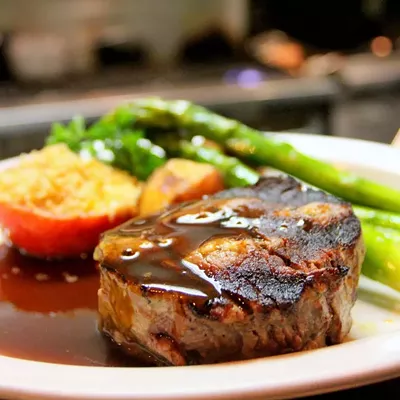LaBute is best known for his quietly vicious first two films, In the Company of Men and Your Friends and Neighbors, but he's also quite an active playwright. By LaBute's standards, Fat Pig--the current late show at Live Theatre Workshop--is a tender romance, but LaBute isn't really cut out for a play revolving around two nice people. Malignant forces do go to work on our hero and heroine, but the whole thing seems just a bit soft. LaBute doesn't bite into his hero's soul; he just gives it a good, hard gumming.
Food is what launches the story. Tom, some sort of midlevel businessman or engineer or something, goes to lunch solo at an overcrowded self-serve restaurant, and finds himself sharing a table with an obese but self-assured librarian named Helen. They meet over the scant remains of her fatty pizza and the wan promise of his demure salad, and soon they bond over her extra pudding. Clearly, there's more chemistry at this table than what went into Tom's diet soda.
Tom and Helen begin dating, but Tom is ashamed to admit to anyone that he's seeing a fat girl, no matter how appealing she may be in every other way. He dodges a woman from accounting, Jeannie, with whom he has an on-again, mostly off-again relationship, and he evades questions from his colleague Carter, a trim fellow who buys extra-large in the jerk department. Crude, sexist, insensitive, manipulative, bullying--Carter passes for Everyman in Neil LaBute's world.
LaBute has been accused of misogyny because of the relish with which his devious male characters mistreat women (and because of the cold manipulativeness of his female lead in The Shape of Things). But this charge misses the point. LaBute isn't into misogyny so much as misanthropy. His women are victimized because his men are monsters, and LaBute means us to see them as monsters, and he means to show us that those men who are not contemptible monsters are contemptible weaklings. He doesn't let women off the hook, either, least of all in Fat Pig. Assholes, he reminds us through one of Jeannie's outbursts, attach themselves to both genders.
Yet in Fat Pig, LaBute proves less a virtuoso of sheer meanness than in his earlier work. Helen, especially as portrayed at Live Theatre Workshop by Megan Patno, is too emotionally strong and comfortable in her body to be a ready victim; she lacks the natural vulnerability that would make her a more interesting character. Which leaves Tom, a typical LaButean coward, as the too-easy target of his colleagues. Christopher Johnson plays Tom as a straight-ahead young man who's slightly ill at ease with everyone, because he realizes how easy he is for friends and foes to goad and manipulate.
Fatally, LaBute tries to make the play's two antagonists a little sympathetic, but he doesn't do it wholeheartedly. Carter has an intellectual justification for his--and society's--embrace of taboos and disgust, but it's nothing we haven't heard before: "We're all just one step away from being what frightens us. What we despise. So we despise it when we see it in anybody else." Nice that he got something out of Psych 101, except when he and LaBute use the textbook to evoke our sympathy for his aversion to fat women: As a kid, he was embarrassed by his 350-pound mother. Well, boo-hoo; this is a pathetic justification for being a sadistic jerk.
And Jeannie's excuse for turning into a bitter harpy? Apparently she's dated only men from Neil LaBute scripts.
So the characters are not quite fully fleshed out (obesity aside); the stakes are pretty low (if Tom breaks up with Helen, she shows every sign of being able to soldier on); and Carter never quite kicks in to full Machiavelli mode (just forget about flirting with the Marquis de Sade).
Without his customary brutality and cruelty, what does LaBute have to offer here? Hostility looking for an easy target. Limp efforts at humiliation. The final scene is painful, but it's self-inflicted pain, and then the play abruptly stops, as if the whole thing has become too trivial to hold the playwright's attention.
Director Chuck Rankin and the actors, though, do pay attention, and LTW's production is not without merit. Whether or not Patno's conception of Helen is too strong for the long haul, at least from moment to moment, it's refreshing to see an overweight character played with dignity and confidence and none of the standard fat-person clichés. Johnson, even though he and his fellow actors tend to tread on each other's lines in a way that soon seems mannered (or just jittery), has some good interiority going on behind every line.
Arya Arabshahi is oily fun as Carter, for whom all this is a game without consequences; his degree of calculated maliciousness is nicely ambiguous. Seren Helday smartly keeps Jeannie out of bitch mode until absolutely necessary, making her climactic viciousness more arresting.
Interestingly, Rankin blocks much of the action at the edges of the stage; except at the very end, Tom and Helen are usually pushed to the margins, while only the conventional and small-minded Carter and Jeannie move comfortably at the center. This creates striking visual metaphors, but poor sight lines.
Still, while the performances keep us engaged from scene to scene, ultimately, the play's substance proves a bit slimmer than its heroine.











